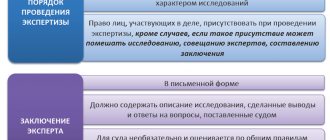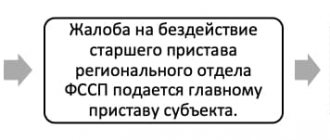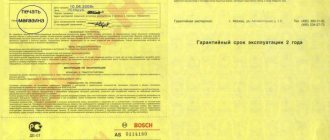When all legal options to protect their rights in their home country have been exhausted, many people think about filing a complaint with the European Court of Human Rights. In reality, only a few apply to the ECHR, because it is generally accepted that the procedure is very complicated and requires a long time and significant financial costs. This is partly true. And yet there are examples where this highest court, acting in full compliance with the Human Rights Convention, takes the side of the applicant.
How to understand whether there is a prospect of restoring your rights in the European Court? And if there is, then what path remains to be taken? About this in our article.
How did the ECHR appear and why is it needed?
The European Court of Human Rights (ECtHR) is a supranational or, in other words, an international court.
The main purpose of the court is to consider applications from citizens and groups of individuals who claim that any member state of the ECHR has violated human rights provisions, both civil and political. The ECHR was created in 1959 on the basis of the European Convention on Human Rights. Initially, the mechanism for the protection of human rights involved the work of three bodies that monitored the observance of rights: the European Commission of Human Rights, the European Court of Human Rights and the Committee of Ministers of the Council of Europe. However, since November 1998, after Protocol No. 11 came into force, all bodies were replaced by one – the ECHR. It is located in the Human Rights Palace in Strasbourg (France), next to the Council of Europe. Any person can apply to the court, but he must file a complaint in the national language of one of the countries that recognize the jurisdiction of the ECHR.
The jurisdiction of the court was recognized by 47 member states of the Council of Europe. Russia recognized the court's jurisdiction in 1998 . The fact is that, according to the Constitution of the Russian Federation (Article 15), Russia recognizes the supremacy of international law over national law. In accordance with this, Russia began to recognize the main international treaty - the Convention for the Protection of Human Rights and Fundamental Freedoms. The final recognition of jurisdiction was carried out on May 5, 1998, when Federal Law No. 54 (“On the ratification of the Convention for the Protection of Human Rights and Fundamental Freedoms and its Protocols”) of March 30, 1998 came into force in Russia.
After ratification of the Convention, Russia began to participate in the selection of the judiciary. Judges are elected by PACE deputies every nine years.
At the moment, the court has 47 judges - one from each of the countries that have recognized the jurisdiction of the court, including Russia.
What is the complaint about?
Contrary to popular belief, the European Court considers only a limited range of issues. In particular, the ECtHR does not have jurisdiction to hear a case in the first or appellate instance, and cannot satisfy the claim or refuse the plaintiff. The subject of the complaint submitted to the ECHR must be related to the violation of human rights and freedoms, regardless of his citizenship.
You can file a complaint if there are violations of the rights and freedoms provided for by the European Convention, including:
- if the rights of a party to a national dispute to a fair trial are violated;
- in case of violation of the right to freedom of thought, religion and conscience;
- if the applicant has faced torture, humiliation or inhumanity by the applicant;
- if the right to free elections is violated;
- if an error was made during the trial and the applicant demands payment of fair compensation;
- if, during the consideration of criminal cases in the second instance, violations of substantive or procedural law were committed;
- if the applicant refers to violations of privacy and family life, the right to housing and confidentiality of correspondence;
- other violations of rights and freedoms provided for by the Convention.
Thus. The ECtHR will not deal with the case on its merits, since this is the prerogative of the courts of national jurisdiction. The only exception is the verification of the findings of the national court of second instance in criminal cases. In this case, the ECHR has the right to point out violations committed by domestic courts, demand the cancellation of the verdict and re-examine the case.
In practice, the majority of citizens’ appeals are related to the following circumstances:
- violation of procedural deadlines for consideration of civil and criminal cases (for example, judicial red tape in a criminal case is an absolute violation of rights, as a result of which a citizen remains in a pre-trial detention center or under another preventive measure for years);
- to torture, bullying and extortion of testimony, which domestic law enforcement agencies are guilty of;
- to collect monetary compensation when a verdict or decision in a civil case is overturned (the said compensation, according to the norms of the legislation of the Russian Federation, amounts to negligible amounts, which forces citizens to seek protection from the ECHR);
- to the refusal of national judicial authorities to accept a claim or complaint for consideration.
Consequently, when filing a complaint with the European Court, you must immediately indicate what the violation of human and civil rights and freedoms was. An attempt to file a claim for consideration on the merits will result in the return of documents, since such disputes are not within the competence of the ECHR.
Abstract complaints are not accepted for consideration, i.e. in the absence of a direct violation of the applicant's rights and freedoms . Therefore, it is impossible to challenge in this manner the provisions of normative and by-laws adopted by the state, regional or municipal authorities. There are also exceptions to this principle if the applicant proves a potential violation of his rights by the challenged norms. For example, you can refer to a similar case, already considered by the judicial authorities of the Russian Federation, in which the application of a controversial provision of law resulted in a violation of the rights and freedoms of another citizen.
You can also file a complaint if the rights and freedoms of others are violated . For example, his government departments of the Russian Federation caused damage to a citizen; relatives whose personal rights were also violated can apply to the ECHR. For example, if an accused or suspect dies as a result of inhumane treatment or torture in law enforcement, relatives may demand fair compensation and bring the perpetrators to justice.
Who is complaining to the ECHR?
Russians have become leaders in cases before the ECHR.
The annual number of applications and complaints to the European Court has begun to grow since the early 2000s. The peak occurred in 2011, when the queue of complaints amounted to more than 151 thousand. After this, there was an outflow, and in 2021 the queue was at about 80 thousand complaints.
But the queue does not mean that all reported complaints will be considered on their merits. As a rule, more than 90% of complaints are eliminated because they have no basis for consideration.
Thus, according to the ECHR report for 2021, the court issued a total of 993 decisions in relation to all countries that recognized the jurisdiction of the European Court. At the same time, Russia became the leader in the number of decisions made - 228. All decisions related to violations of the rights of Russians and 222 of them were satisfied.
In 2021, there was a sharp jump in decisions against Russia; thus, at the end of 2015, only 116 cases were considered against our country. Russia’s closest “competitors” are Turkey, Romania and Ukraine (in relation to each of them, ECHR judges issued only 70 to 77 decisions in 2021).
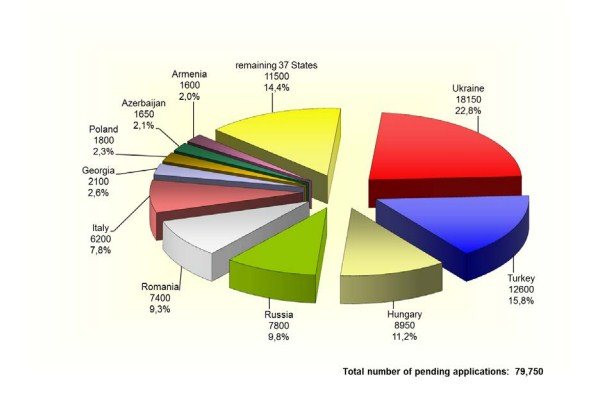
2016 demonstrated another trend: a significant reduction in complaints from Russia.
At the moment (January 2021), 7.8 thousand Russian applications are awaiting consideration by the ECHR (9.8% of the total number of complaints, while a year earlier this figure was 14.2%). The leaders were Ukraine with 18.1 thousand complaints (22.8% of the total number of complaints), Turkey with 12.5 thousand complaints (15.8% of the total number of complaints) and Hungary with 8.9 thousand complaints ( 11.2% of the total number of complaints).
Participants in the case
The right to appeal to the ECHR is associated with a violation or restriction of human and citizen freedoms. Therefore, the following categories of entities can file a complaint:
- citizens of the Russian Federation or another state, stateless persons, if their rights and freedoms were violated by the judicial authorities of Russia;
- citizen groups;
- associations of citizens, including legal entities, non-profit organizations, and other similar entities.
It is important that this circle does not include government officials, as well as federal, regional and municipal authorities. The complainant is always considered as a potential victim of illegal actions on the part of the state and its authorized agencies.
Accordingly, a complaint to the European Court is always filed against the state as a public entity. Russia is a party to the Convention, ratifying it in 1998, which means it is responsible for the guilty actions of its official departments and officials, as well as for the failure to provide citizens with regulated rights and freedoms. The state cannot withdraw from the case if the complaint is admissible. However, refusal to cooperate with the ECHR, including the intention to send a representative to consider the case or submit the requested documents, is not an obstacle to the verdict.
Are all ECHR decisions implemented in full?
The flow of complaints to the ECHR and their consideration does not mean that the court’s decision will be implemented by the Russian side in full.
This is also evidenced by statistics: at the moment, more than 1.5 thousand decisions of the ECHR against Russia have not been implemented. The most significant such case was the unprecedented ruling of the European Court on the complaint of shareholders of the oil company YUKOS against Russia. In 2014, the ECHR ordered more than 1.8 billion euros to be paid to victims. But this decision was never implemented. Moreover, the Constitutional Court of Russia, by its resolution of January 17, 2021, decided that it runs counter to the Constitution of the Russian Federation and cannot be executed. Thus, the YUKOS case has been put to rest - the ECHR decision will definitely no longer be implemented.
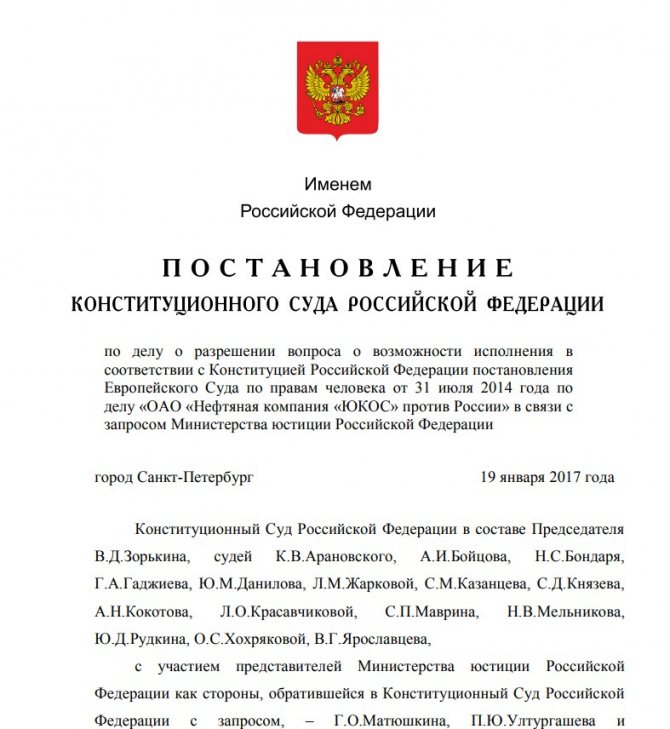
This is not the first ruling of the Constitutional Court of the Russian Federation that has refused to recognize the decision of the ECHR. In April 2021, the Constitutional Court issued a resolution dated April 19, 2021 No. 12-P “on resolving the issue of the possibility of execution, in accordance with the Constitution of the Russian Federation, of the ruling of the European Court of Human Rights of July 4, 2013 in the case “Anchugov and Gladkov v. Russia” in connection with a request from the Ministry of Justice of the Russian Federation.”
Procedure for considering a complaint
All preliminary actions to consider the case will take place through the Secretariat of the ECHR:
- sending notifications and requests to the complainant until the complaint is considered acceptable and justified;
- sending information about the complaint to the Russian Federation, with an offer to submit objections, feedback or agreement with the applicant’s requirements;
- request for case materials or documents from the defendant.
Each state that has ratified the European Convention has its own representative at the ECHR. Upon receipt of a request, the state is not obliged to cooperate with the court and provide any data, however, such a refusal will be considered as an indirect recognition of the legitimacy of the applicant’s claims.
If the complaint is found admissible, a case is formed for consideration. First of all, the opportunity will be realized for a friendly settlement of the dispute, in which the ECHR agencies will act as a mediator. If the parties settle the dispute amicably, further legal proceedings will be terminated. Otherwise, the proceedings will proceed according to the following rules:
- Both parties are notified of the place and time of consideration of the complaint, but personal appearance is not required;
- the proceedings are based on the materials presented, while hearing the parties, calling witnesses, specialists or experts is possible only in exceptional cases (such a decision must be made by the Judicial Chamber of the ECHR itself);
- when satisfying the complaint, the ECHR must indicate what violations of rights and freedoms the state must eliminate, as well as the amount of compensation that the applicant will receive (all awarded amounts are calculated in euros);
- the final decision is sent to the Government of the Russian Federation, which is obliged to monitor the timely and correct execution of the ECHR act.
Since 2021, the Russian Federation has had a rule according to which the Constitutional Court of the Russian Federation can recognize certain decisions of the ECHR as not enforceable. Although such a measure is formally contrary to the European Convention, it can be applied in individual cases.
The duration of proceedings before the ECHR is difficult to predict in advance. Individual complaints that raise the most acute and significant problems with violation of rights can be initiated for proceedings within 6-12 months. However, most cases are dealt with in order of priority, and the waiting period can reach 4-5 years. It is almost impossible to influence the reduction of the term, since the Judicial Chamber of the ECHR considers many complaints against all countries party to the Convention. At the moment, amendments are being made to the ECHR regulations to provide for a significant reduction in the waiting period in line for consideration of a complaint.
Why do our fellow citizens go to the ECHR?
The answer is obvious: in Russia, indeed, there are violations of human rights at various levels, including in the penitentiary system.
A considerable part of complaints comes to the ECHR from prisoners and arrested persons. Often, decisions of the European Court are used for broad public discussion, attracting the media and the public to the problem of a particular person. Often this is what allows the problem to be resolved in favor of the complainant.
But it happens that ECHR decisions are also used to gain additional points by politicians. It is possible that these are the reasons that motivate oppositionist Alexei Navalny, who has twice recently appealed to the ECHR to protect his rights. For the first time, the European Court found violations of his rights when considering the so-called “Kirovles case,” and the second complaint will be devoted to the Central Election Commission’s refusal to allow the politician to be nominated for the post of President of Russia.
Design rules
Fill out the form accurately, briefly, reliably, without distorting information and only on the essence of the controversial issue.
We list the main points that will be reflected in the document:
- information about the applicant and his residential address;
- describe the essence - what exactly the rights were violated;
- list all actions taken to protect your rights in the Russian Federation;
- express your request (for example, to cancel the decision or pay monetary compensation);
- list all court decisions in the case and attach copies of them;
- Put your personal signature and date of completion.
Use only the current form posted on the official website of the ECHR, as third-party electronic resources may contain an outdated form. Click on the link and download the form to fill out. In this section you can find instructions and regulations, which explain everything in detail.
(The files must be downloaded to your computer in order for them to display the content correctly. Source: official website of the ECHR.)
The application itself is filled out exclusively on the approved form. The slightest inaccuracy and the complaint will be rejected. The following examples of filling out will only partially help you understand the basic rules for filing complaints. It is problematic to fill it out on your own; not even every lawyer knows all the intricacies of drawing up an appeal. It is best to contact a professional who has experience in this area.
Why does the ECHR reject the complaint?
Filing a complaint to the ECHR is a necessary solution for those who believe that their rights have been grossly violated by Russian justice.
In order not to waste time, money and nerves, you need to wisely choose your representatives - lawyers who will help you draw up a complaint. In Russia, many lawyers provide services for preparing applications to the ECHR, but, as the practice of the ECHR shows, more than 90% of complaints are simply declared inadmissible for formal reasons and the court refuses to consider them on the merits.
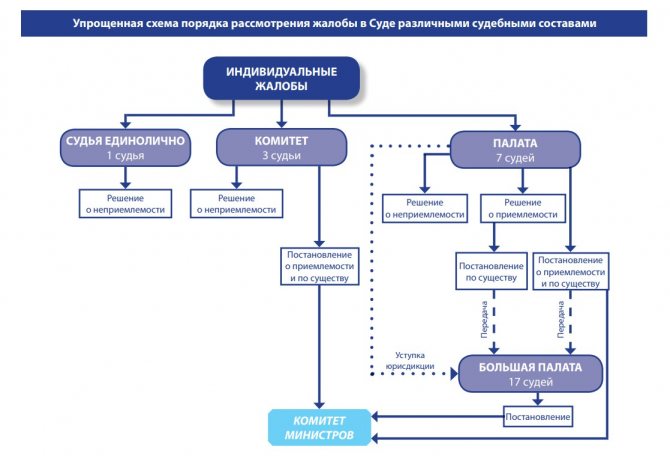
When to file in civil cases
The basic rule for accepting a petition is to go through all national courts, in which case these include:
- consideration in the courts of first instance;
- filing an appeal;
- verification by higher authorities of a previously made decision - cassation procedure;
- wait for the second cassation.
Only after waiting for the decision of the Judicial Collegium in the Supreme Court of the Russian Federation after cassation, you can send a complaint to the Strasbourg Court, the application will be considered, if there are no errors in filling out.
How to properly file a complaint to the ECHR?
Before filing a complaint, decide whether you will use the services of legal companies or do it yourself.
If you decide to apply on your own. Please note that your failure to comply with even the slightest technical procedures may result in your complaint not being considered. This is the biggest risk, since after a failed attempt it will be impossible to file a second complaint due to past deadlines.
Where to begin?
First you need to go to the official website of the court. Open the form on your computer (not in a browser), fill it out, print it, and attach the necessary documents.
Before filling out, read the Rules of Court (Article 47), which sets out information about what and how should be stated in the complaint.
To avoid making mistakes, use the practical guide prepared by specialists of the European Court and familiarize yourself with the HUDOC database, which contains decisions already made by the ECHR. Perhaps the database will contain ECHR cases and decisions on them on a similar topic.
Below is a video instruction of the entire procedure for filling out the complaint form..
If you did everything correctly and attached copies of documents, then all that remains is to send the complaint to the European Court.
You can send a complaint by mail to:
The RegistrarEuropean Court of Human Rights
Council of Europe
F-67075 Strasbourg cedex
As soon as your complaint is received by the ECHR, it will be checked by employees of the court secretariat.
They will conduct a first superficial analysis - compliance with technical requirements and the availability of data on a possible violation of human rights. If errors are found, the secretariat sends the complaint to the judges, who make a decision on the inadmissibility of the complaint. The complaint verification procedure takes up to a year.
If the complaint is filed correctly, then it is assigned to a certain section of the court and included in the waiting list of cases that will be considered on the merits.
At this time, the court requests a position on the complaint from representatives of the country against which the complaint is filed. Afterwards the case is transferred to the reporting judge. The judge examines the issue and requests the necessary evidence from the parties. Only after this the complaint is considered on its merits. What could be the outcome of the review? Either “reconciliation” of the parties, or making a ruling on the violation of human rights, the so-called judgment .
Stages of self-referral
Let us schematically present the main steps that need to be taken to achieve justice.
Steps
Actions
For the European Court, French and English are considered the official languages; if you wish, you can fill out the form in your native language - Russian. The applicant’s request is considered within several months, the maximum period is 1 year. The length of the process and the number of judges deciding on the application depends on the complexity of the case.
It is recommended to use the services of a lawyer who speaks one of these languages, or to invite a translator who knows a lot about legal terms.
Will Russians have the ECHR in 2021?
Considering the increased politicization of a number of cases considered by the ECHR (recently, representatives of Ukraine have been actively filing complaints against Russia), at the end of 2021 information appeared about Russia’s possible withdrawal from the Council of Europe and, as a result, the suspension of its work in the ECHR.
There was even talk of “freezing” contributions to the court budget (the department functions with these funds). This statement, circulated by the federal media, caused a flurry of indignation - after all, Russia's exit will close the opportunity for Russians to file complaints to the ECHR - formally, the court does not have the right to consider a complaint against the actions of a country that does not recognize its jurisdiction. However, at the end of 2021, ECHR judge from Russia Dmitry Dedov assured the public that the question of our country’s withdrawal from the European Court was not yet raised. 2021 will show whether the media's predictions will come true or not.
Reasons for refusal to consider
The complaint is sent only in a strictly established form; any deviation from the filling rules will lead to refusal of admission.
In addition, there are a number of other situations when the Registry of the European Court will reject the application:
- the appeal is anonymous;
- the document contains false information;
- copies of court decisions of Russian judicial authorities are not attached;
- the complaint was filed not against the state, but against private structures.
If you independently file a complaint with the Strasbourg court, then in this case the procedure is free, since the ECHR does not charge fees or charges for consideration of the application. You only need to pay for postage.
Who can file complaints against whom?
Complaints can be filed by individuals, organizations and even entire states. The defendant can only be a state that has ratified the Convention. In this case, the violation must be committed by an authority. The Strasbourg Court does not consider complaints against individuals or companies.
Only the person who was directly the victim of the violation or the legal representative of this person can complain to the ECHR. You cannot simply file a complaint on behalf of other citizens.
Also, you cannot submit a general complaint to the ECHR against the laws of the country that seem unfair to you, if the state has not violated the norms prescribed in the Convention in relation to you personally.
How to fill out the form correctly
To file a complaint, the victim must send to the ECHR a form filled out in accordance with the requirements of Article 34 of the Convention and the Rules of Court. The relevant sections of the document must contain all the necessary information, otherwise its acceptance will be refused. You must specify:
- Data of the applicant (individual or organization). In this section you should write reliable personal information that will be used for identification: full name, full postal address, date of birth, citizenship, contact phone number, etc. In the “Address” column you should write the personal address of the victim, so that if necessary he could be contacted directly rather than through a representative. If a citizen does not have a permanent place of residence, then for these purposes you can use the address of friends/relatives or a post office box. If several persons make a claim, then each of them must provide similar information on a separate sheet, which will be assigned a serial number.
- The State(s) against which the claim is being filed. In this section, it should be noted those states that, in the opinion of the citizen, have violated his legal rights. It is important to remember that the ECHR considers claims only against parties to the Convention.
- Representation of the interests of applicants (individuals and organizations). If the victim has a representative who will defend his interests in the European Court of Human Rights, then his personal and contact information must be indicated in this section. At the end of the section there must be a personal (not facsimile) signature of the plaintiff and the representative.
- Subject of the complaint. Describe the essence of the appeal, adhering to certain rules and recommendations.
- Statement of facts. In this section, the victim clearly and briefly describes the circumstances of the case, adhering to the chronological order of events. To complete the picture, you need to accurately indicate the dates of the events described and attach documents that will confirm the existence of grounds for appealing to the European Court of Human Rights.
- Statement of the violations that took place. In the “Article” field, the citizen must write which article of the Protocol or Convention, in his opinion, was violated by the state. And in the “Explanations” field you should briefly describe how this was implemented. For each claim, a separate explanation must be given, briefly outlining the facts indicating non-compliance with rights.
- Compliance of the complaint with the conditions of admissibility established by the Convention. In this section, it is important to show that the defendant (the state) was given time to resolve the conflict at the domestic level. The victim's goal is to confirm that he has used all the remedies available to him provided for in the legal system of the state acting as the offender. To do this, you need to indicate the exact date of the final decision of the higher court and the registration number of the case (copies of court decisions must be sent as attachments to the claim).
- Information on additional remedies and international proceedings used. If positive answers are given to the questions in this section, detailed explanations and appropriate comments should be given in the fields specially designated for this.
Complaint form to the European Court Complaint form to the European Court Complaint form to the European Court
Important! Before sending the documents, it is better to make a copy of the completed form. Then it will be possible to easily submit a new claim if the first appeal is refused consideration.
How to describe the subject of the complaint
In a separate section, the applicant is required to provide information that relates to the essence of the appeal, listing key facts and possible solutions.
It is necessary to briefly and concisely describe what the violation of rights is and what the plaintiff tried to do to protect himself (you should not quote from court decisions, piling up the text of the document, since copies of them will be attached to the form).
How efficiently and quickly the claim will be considered depends on how correctly the text of this section is drawn up. In this regard, it is important to express your thoughts concisely, avoid unconstructive information and not refer to unimportant facts.
Attention! The text must fit into the allocated section, since if this requirement is not met, consideration of the case will be denied.
If the dedicated field in the form is not sufficient for this, additional information can be provided in a separate application, the volume of which should not exceed 20 pages. But this can only be an explanation of a summary of information (description of violations, facts, etc.) given in the form.
The text should be easy to read. The same applies to the additional application, which has the following requirements:
- acceptable font size for printed text is no more than 10 points in footnotes and 12 points in the main part;
- all pages must be numbered sequentially;
- the application is printed on A4 sheets;
- document margins no more than 3.5 cm wide;
- The text must have numbered paragraphs.
The information that is submitted in the documents and the completed form is publicly available, with regard to the personal data of the applicant and representative (for example, they can be posted in the HUDOC database). If the victim does not want such information to be made public, he is obliged to make a corresponding statement, explaining why the general principle of free access to information should be violated.
Important! A decision to anonymize an applicant can only be made in exceptional cases if there are compelling reasons and grounds.
If the requirements are not met, the claim may be refused, while the European Court of Human Rights may at any time request additional information, for which a fixed period will be allocated.
The filing date of the claim is the date of mailing indicated on the postmark. However, the ECHR reserves the right to revise this criterion in the presence of certain circumstances and factors.
The plaintiff is obliged to inform about any changes in the situation and change of address if this is directly related to the essence of the problem.

